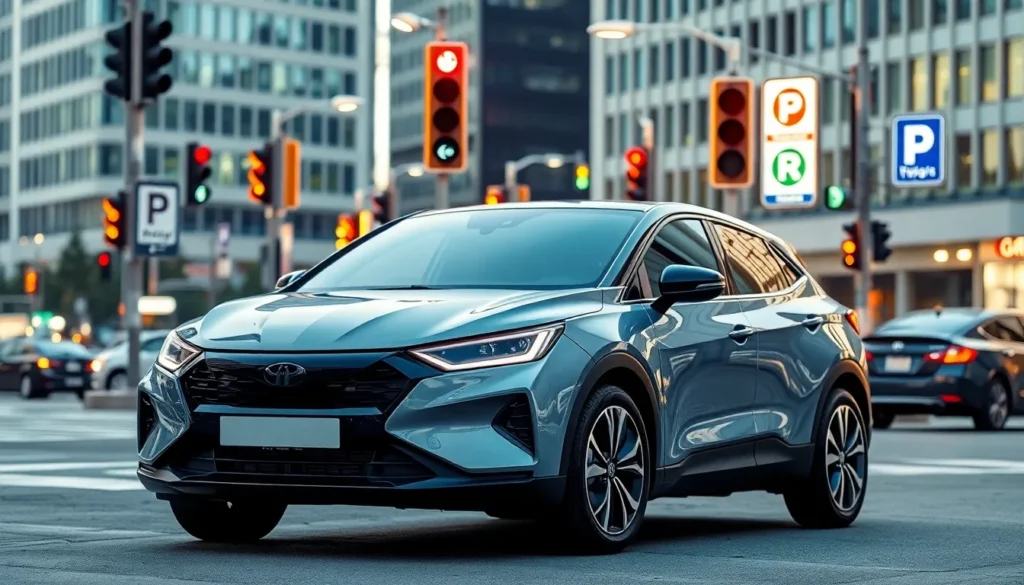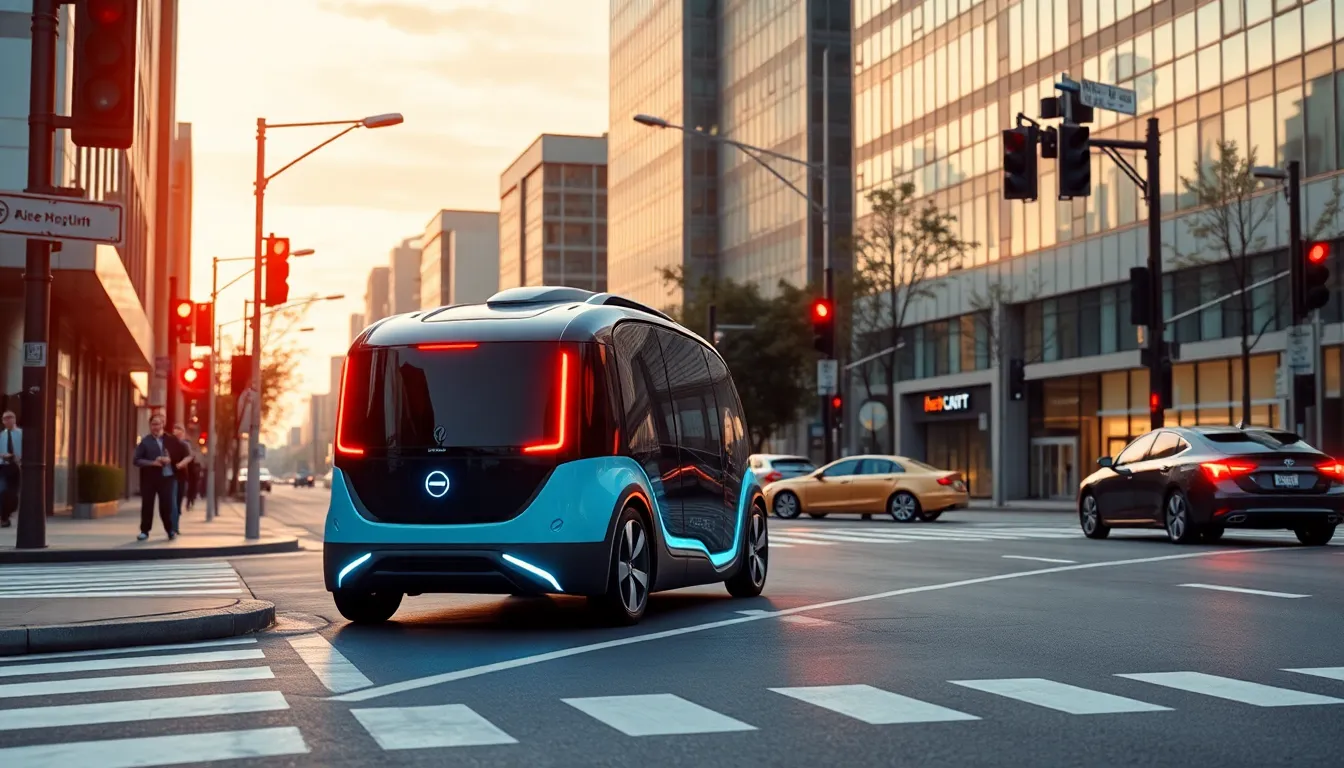Table of Contents
ToggleThe automotive world is revving up like never before, thanks to the Internet of Things (IoT). Imagine cars that not only take you from point A to point B but also chat with traffic lights, warn you about potholes, and even remind you to grab coffee on the way. It’s like having a personal assistant with four wheels!
Overview of IoT in Automotive
IoT significantly reshapes the automotive landscape, promoting innovations and enhancing vehicle capabilities. Smart vehicles now offer features that improve driver safety and convenience.
Definition of IoT
IoT refers to the interconnected network of devices that collect and exchange data. These devices use sensors and software to communicate over the internet. In the automotive context, IoT encompasses smart cars that monitor performance, track driving patterns, and facilitate communication with other vehicles and infrastructure. Ultimately, this technology plays a crucial role in creating a seamless driving experience.
Importance of IoT in Automotive
IoT delivers substantial benefits to the automotive industry. Enhanced safety ranks as a top advantage, with real-time data helping prevent accidents. Improved efficiency also stands out, as vehicles can optimize fuel consumption through analytics. Furthermore, IoT enables predictive maintenance, allowing timely repairs that reduce costs. Integration with smart city infrastructure fosters an environment for better traffic management and reduced congestion. These advantages indicate that IoT fundamentally transforms how people interact with vehicles.
Applications of IoT in Automotive
IoT shapes various applications within the automotive sector, enhancing vehicle functionality and infrastructure interaction.
Smart Vehicles
Smart vehicles utilize IoT technology to enhance driving experiences. These cars communicate real-time data, offering insights into vehicle health and performance. Features such as advanced driver-assistance systems improve safety by alerting drivers to potential hazards. Analytics draw from data collected on road conditions and traffic patterns to optimize routes. Additionally, infotainment systems offer personalized entertainment options, making each journey enjoyable. Through continuous software updates, manufacturers maintain vehicle security and introduce new features seamlessly. This results in a constant evolution of vehicle capabilities and user experience.
Connected Infrastructure
Connected infrastructure plays a crucial role in integrating smart vehicles with traffic management systems. Traffic lights equipped with IoT sensors promote smoother traffic flow by adjusting based on real-time vehicle density. Parking solutions connected to IoT provide drivers with availability information, reducing time spent searching for spaces. Moreover, emergency services receive immediate notifications about accidents, enhancing response times. Cities can analyze traffic patterns to make data-driven decisions regarding road improvements and urban planning. Such integration transforms urban mobility by creating a networked environment for vehicles and infrastructure.
Benefits of IoT in Automotive
The integration of IoT in automotive applications creates several key benefits that enhance vehicle performance and user experience.
Enhanced Safety Features
Enhanced safety features arise from real-time data sharing between vehicles and infrastructure. Advanced driver-assistance systems leverage IoT technology to alert drivers about potential hazards and unsafe conditions. Vehicles equipped with IoT sensors monitor surroundings continuously, adapting to changing environments quickly. Alerts about road conditions, accidents, or obstacles improve reaction times significantly. Emergency response services receive instant notifications through connected systems, reducing response time during critical incidents. Collectively, these features contribute to a safer driving environment, reducing the likelihood of accidents.
Improved Fuel Efficiency
Improved fuel efficiency results from data-driven insights generated by IoT applications. Smart vehicles continuously analyze driving behavior and offer real-time feedback to drivers. By optimizing routes based on traffic patterns and road conditions, these cars minimize fuel consumption. IoT sensors also track engine performance, allowing predictive maintenance to prevent inefficiencies. These systems help maintain optimal fuel usage, pushing the limits of conventional efficiency standards. Integration with smart city infrastructure further supports fuel-efficient travel by promoting sustainable driving routes. Ultimately, IoT enhances both vehicle economy and environmental sustainability in the automotive sector.
Challenges of IoT in Automotive
Integrating IoT technology in vehicles introduces several challenges. These issues must be addressed to fully harness the advantages of smart automotive systems.
Security Concerns
Security vulnerabilities pose significant risks in IoT-enabled vehicles. With constant data exchange, hackers can exploit weak points in the network. Malicious actors can gain unauthorized access, compromising vehicle control and personal data. Implementing robust encryption methods reduces exposure to cyber threats. Regular software updates help patch known vulnerabilities, enhancing overall safety. Manufacturers must prioritize security throughout the development lifecycle to ensure vehicle integrity.
Data Privacy Issues
Data privacy represents another major challenge in the automotive sector. Smart vehicles collect vast amounts of personal data, raising concerns about user surveillance. Individuals often remain unaware of what data is collected and how it’s used. Establishing clear data management policies fosters transparency and builds consumer trust. Compliance with regulations like GDPR is essential for protecting personal information. Manufacturers must implement strong data protection measures to alleviate privacy fears, ensuring users maintain control over their information.
Conclusion
The integration of IoT in the automotive industry is paving the way for smarter and safer driving experiences. As vehicles evolve into interconnected systems, they not only enhance user convenience but also contribute to overall road safety and efficiency. The ongoing advancements in IoT technology promise to redefine urban mobility and transform how people interact with their vehicles and infrastructure.
Addressing the challenges of security and data privacy will be crucial for manufacturers to build consumer trust. By prioritizing robust protection measures, the automotive sector can fully leverage the potential of IoT while ensuring a secure and enjoyable driving experience. The future of transportation is undoubtedly interconnected, and embracing this change is essential for progress.








